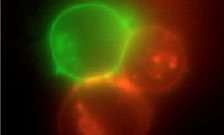Scientists discover important cancer defence switch

(Medical Xpress) -- A multi-disciplinary team of researchers at King’s College London have captured the first live images of a key molecular switch in the body’s natural defence system against tumour cells.
Published recently in the journal Science Signaling, the study looked at a type of white blood cell, called a Natural Killer (NK) cell. These are immune cells that protect the body by identifying and killing infected and diseased cells.
Cancer is known to evade the normal immune response by suppressing ‘distress’ signals monitored by immune cells. Recently, there has been a new emphasis on treatments that can improve a patient’s own anti-tumour immunity by interfering with the signals within anti-tumour immune cells. But the precise nature of signalling between cells at the exact point when immune cells engage the cancer cells is difficult to demonstrate without imaging.
Experts from different disciplines across King’s, including: the Randall Division of Cell & Molecular Biophysics; Division of Cancer Studies; Departments of Mathematics and Physics; as well as from the Gray Institute for Radiation Oncology and Biology (University of Oxford), came together to study these interactions, and to image the regulation of a key molecular switch (Cdc42) in NK cells for the first time. This molecular switch, Cdc42, is important for activating the cell’s surveillance system that searches for and destroys cancer cells.
The researchers discovered that an important group of enzymes (PI-3 kinases) play a key regulatory role on Cdc42 in NK cells.
PI-3 kinases are currently being explored in trials as a potential target for cancer treatment. Therefore the researchers warn that if PI-3 kinases are inhibited to treat a tumour, the immune system’s natural killer mechanisms may also be inhibited. This means that although there is good scientific evidence for targeting PI-3 kinases in cancers, trials exploring these potential treatments should take the findings of this study into account.
Professor Tony Ng, Richard Dimbleby Chair of Cancer Research, Head of Cell Biology and Imaging in the Division of Cancer Studies at King’s, said: ‘This is an exciting finding, which helps us better understand the body’s own natural defences against cancer. It is vital that these findings are taken on board by those currently carrying out trials to look at PI-3 kinases, so they can monitor the impact of these potential therapies on the immune system.’
Dr Leo Carlin who was part of Professor Ng’s team during the study, said: ‘We have been able to directly visualise not only the location of important molecules in NK cell function, but also whether they are switched on or not. A cross-disciplinary approach also allowed us to intelligently screen for key regulators of these molecular switches.’
















